The UK economy experienced marginal growth of 0.1% in November, driven primarily by the services sector, which includes pubs, restaurants, and hotels. This positive contribution from the hospitality industry was evident in the strong sales reported by pub groups like Young’s and Mitchells & Butlers during the same period. Despite this glimmer of positive news, the overall economic outlook remains subdued, with experts forecasting stagnant growth for the last quarter of the year. This sluggish performance comes amidst growing concerns about the impact of recent Budget announcements, particularly the increased National Insurance contributions for employers, which are expected to add significant costs to businesses across various sectors.
The fragile economic landscape is further complicated by rising inflationary pressures and the ongoing cost-of-living crisis, which is impacting household finances and consumer spending. The number of mortgage defaults has been steadily increasing, as households grapple with rising interest rates and higher monthly repayments. This precarious situation adds further pressure on Chancellor Rachel Reeves, who has prioritized economic growth but faces significant challenges in delivering on this promise amid growing economic headwinds. The recent turmoil in the government bond market has also exacerbated the situation, making public debt even more expensive and adding further constraints to the government’s fiscal maneuverability.
Adding to the economic uncertainty, several companies have issued warnings about potential job cuts and scaled-back investment plans in response to the anticipated increase in staffing costs. This cautious approach reflects the broader economic anxieties and the potential for a prolonged period of slow growth. The Chancellor’s task of stimulating economic growth is further compounded by these preemptive measures taken by businesses, as reduced hiring and investment can further dampen economic activity.
In the corporate world, several notable developments unfolded. Matt Moulding, the CEO of online retail group THG, launched a peculiar attack on the City, using a “deepfake” video to express his frustration with the company’s declining share price. This unconventional move reflects the ongoing tension between THG and investors, following the company’s significant drop in valuation since its IPO. Meanwhile, energy giant BP announced plans to cut 5% of its global workforce, as part of a broader cost-cutting initiative aimed at boosting the company’s valuation. This move signals a strategic shift towards prioritizing short-term investor returns, even at the expense of investments in renewable energy projects.
The retail sector also witnessed mixed fortunes. Poundland announced the closure of 13 stores and a halt to further expansion plans, citing a sales slump attributed to underperformance in clothing and general merchandise. The discount retailer plans to refocus on its core value proposition of offering a wider range of products at its signature £1 price point. In contrast, homeware chain Dunelm reported a sales increase, driven by strong demand for furniture items like sofa beds and folding dining chairs, suggesting that consumers are still willing to spend on home improvements, particularly for items that cater to larger family gatherings.
Finally, food manufacturer Bakkavor, the UK’s largest producer of dips and sauces, warned about the impending price increases for its products. The company cited the increased National Insurance costs resulting from the recent Budget as the primary driver behind these price hikes. This announcement highlights the ripple effect of the Budget changes on consumer prices, adding further strain on households already struggling with rising living costs. The company’s decision to pass on these increased costs to consumers underscores the challenging environment faced by food manufacturers, as they grapple with rising input costs and inflationary pressures.




